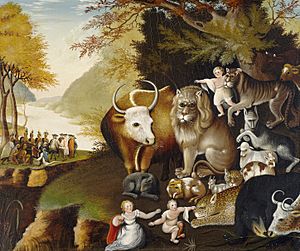Dream Isaiah Saw facts for kids
Quick facts for kids The Dream Isaiah Saw |
|
|---|---|
| American hymn by Glenn L. Rudolph | |

Peaceable Kingdom (Edward Hicks, circa 1834)
|
|
| Genre | Christmas song |
| Occasion | Sermons on peace and Advent |
| Written | 1994 |
| Text | by Thomas H. Troeger |
| Language | English |
| Based on | Isaiah 11:6-9 |
| Meter | 10-10-10-10-7-7-7-7 |
| Composed | 30 September 2001 |
| Published | Oxford University Press, 2004 |
| In memory of those who perished on September 11, 2001 | |
"The Dream Isaiah Saw" is a contemporary classical choral Christmas song, commissioned by the Bach Choir of Pittsburgh and composed in 2001 by Glenn L. Rudolph to the lyrics of Thomas H. Troeger's 1994 hymn "Lions and Oxen Will Feed in the Hay." It has become a holiday favorite. The hymn has become a signature piece of the Washington Chorus and has been performed at John F. Kennedy Center for the Performance Arts. The song has been independently released by many symphonic and college choirs. It is regularly performed by symphonic, college, church, and school choirs during Advent.
History
In preparation for their 2001 Christmas concert In Dulci Jubilo, the Bach Choir of Pittsburgh (led by Brady R. Allred) commissioned five new holiday compositions. Glenn L. Rudolph, an active performer, conductor and composer in the Pittsburgh area since 1978, composed "The Dream Isaiah Saw." Rudolph was working on the piece when the attacks of September 11, 2001 took place. The Dream Isaiah Saw was finished nineteen days after 9/11 attacks and became a dedication to those who lost their lives in that tragedy. Rudolph said that the events of 9/11 had an impact on the music he wrote for the hymn.
The Bach Choir of Pittsburgh and The Pittsburgh Symphony Brass first performed the song at Westminster Presbyterian Church in Upper St.Clair, Pennsylvania on Sunday, December 16, 2001.
Lyrics
The lyrics of a hymn Lions and Oxen Will Feed in the Hay first appeared in the book by Thomas H. Troeger Borrowed Light: Hymn Texts, Prayers, and Poems published by Oxford University Press in 1994. Thomas Troeger drew inspiration from the Book of Isaiah 11:6-9, an Old Testament book in the Bible by a Latter Prophet Isaiah.
See also
 | Misty Copeland |
 | Raven Wilkinson |
 | Debra Austin |
 | Aesha Ash |

